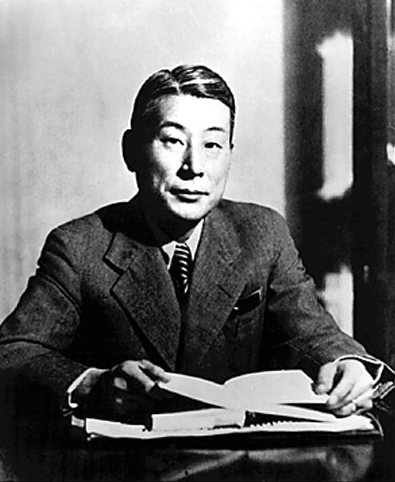Saving 6,000

Chiune Sugihara died on July 31, 1986, in Japan. To his neighbors, he was just another guy. He had worked as an exporter — he was fluent in Russian — and had also been a door-to-door lightbulb salesman. If they thought he had a claim to fame, perhaps it was his curious birthday — January 1, 1900. But when the Israeli ambassador to Japan and a large number of Jews from around the world showed up at Mr. Sugihara’s funeral, they started to find out his true story.
Chiune Sugihara saved 6,000 Jews from the Nazis.
Sugihara was born in Japan on the first day of the 1900s, and before World War II, joined the Japanese Foreign Ministry. In 1939, he was named vice-consul of the Japanese Consulate in Kaunas, then the temporary capital of Lithuania. When war broke out in Europe, Lithuania was mostly untouched. Many Polish Jews, trying to escape the Nazis, fled to Lithuania looking for safety, and due to the sizable Jewish population then in Kaunas, were temporarily successful. But when the Germans turned on the Soviets, that changed. On June 15, 1940, the Nazis invaded Lithuania and began their occupation of the nation — and the mass slaughter of its Jewish population. By July, the foreign embassies in Kaunas were shuttered, per Soviet insistence, as the Germans were rapidly approaching.
Sugihara received a 20-day extension to remain in Kaunas, and for thousands of Polish and Lithuanian Jews, this ended up meaning the difference between life or death. While most of the world had closed its borders to war refugees, neither Curacao nor Suriname (both Dutch colonies) required entry visas. Regardless, the Dutch consul in Kaunas, Jan Zwartendijk, was willing and able to provide entrance permits. Unfortunately, getting to those areas required an exit visa — a now-disfavored restriction on people who want to leave a country. The Soviet Union agreed to issue exit visas provided that the Jewish refugees would pass through Japan on their way to the Dutch colonies, most likely to ensure that the Jews did not remain in the USSR. But Japan refused — despite Sugihara’s three requests — to issue the transit visas. The Japanese, like virtually every other nation around the world, did not want to risk having thousands of poor refugees (especially those of a different culture and language) joining their population.
Despite these repeated orders to the contrary, Sugihara, with the help of his wife Yukiko, began writing visas — an estimated 300 each day for the next four weeks. Even as they departed for Berlin, Sugihara — a low-level diplomat acting in direct violation of the Foreign Ministry’s orders — was throwing visas out his train’s windows, per one account. There is no exact number of how many visas he issued and were, ultimately, used, but estimates range from around 3,000 to 10,000. The generally agreed upon amount, per the Raoul Wallenberg Foundation, is about 6,000 lives saved. To give that number some context, it is about four to five times as many people as Oskar Schindler saved.
After the war, the Japanese Foreign Service relieved Sugihara of his duties, although that may have been part of a massive, post-war downsizing, and not due to his insubordination. Regardless, he’d soon become known as a hero to many. In 1968, one of the people he helped save took a job as a cultural attache at Japan’s Israeli embassy and tracked down Sugihara. Israel later honored the savior of thousands, granting him and his family perpetual citizenship of the tiny Middle Eastern nation.
Bonus fact: After World War II, the newly-formed United Nations adopted the Universal Declaration of Human Rights (UDHR). Article 13, Section 2 of the UDHR states that “Everyone has the right to leave any country, including his own, and to return to his country” — that is, a blanket rejection of exit visas. However, some nations still require exit visas, in spite of the UDHR. Per Wikipedia, that list includes Qatar, Saudi Arabia, Nepal, Uzbekistan, and to a limited degree, Cuba.
From the Archives: Held in Check: How WWII changed the chess world forever.
Related: “The Righteous: The Unsung Heroes of the Holocaust” by Martin Gilbert. 4.1 stars on 22 reviews, available on Kindle.
